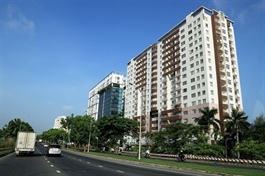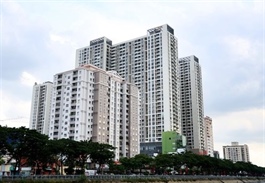Land tax plans must solve speculation issue
Land tax plans must solve speculation issue
The merits of a proposal to impose tax on those who own many houses, land plots, and unused properties in Vietnam are still being debated by both experts and homebuyers.

This draft proposal, aiming to prevent speculation and inflated real estate prices, and recently mapped out by the construction and finance ministries, is expected to be submitted to the National Assembly for comment this month, and approved in May 2025.
In a September report sent to the Government Office on the causes of recent real estate price increases, the Ministry of Construction (MoC) said it would study and propose a tax policy for owners of many houses and lands to limit quick speculation to make a profit.
According to the MoC, the factors contributing to the recent hike in housing prices include several investors, speculators, and real estate brokers. Regarding auctions with winning prices of over $4,100 per sq.m of land without infrastructure on the outskirts of Hanoi recently, the report assessed that many investment groups participate in auctions and then sell immediately to make a profit.
“The buying and selling of many plots of land for illegal profit is common, even in well-organised areas. This hikes up the price of land and homes in the surrounding area,” the report said.
Some groups, investors, and individual real estate brokers distort market information to push the price up, create virtual prices, or take advantage of people’s lack of knowledge to woo them to invest, it added.
Normally, investors of housing projects spend an average of 3 per cent of the selling price to pay to the trading floor and brokers. However, brokers often add more benefit when transacting with buyers. The report claimed that during the rush period, many brokers also use the method of depositing to buy houses and land from sellers, and then increasing the price by 10-15 per cent to sell to others.
In addition, some investors also contribute to pushing up housing prices by offering high selling prices from the beginning, raising the expected profit higher than the average of real estate projects.
Some experts say consumption of the entire market is still weak and so, if the MoC proposal is approved, it will cause the market to fall into a deadlock once again.
Nguyen Van Dinh, an independent real estate legal expert, said that one of the reasons for the escalation of house and land prices is the phenomenon of speculation and hoarding, supported by banks.
“This is a VIP customer group of banks because the loans are always mortgaged with houses and land - which are considered to almost always increase in price and have little risk. The investment needs of the people are legitimate, but when this phenomenon is at a high level, it becomes mere speculation and hoarding of homes and land, distorting the market and wasting resources,” Dinh said.
Taxing houses and land is a mandatory solution already stipulated in regulations on improving the effectiveness and efficiency of land management and use, Dinh added.
Financial expert Dinh The Hien said that property tax is simply understood as a tax collected on people with assets, and more assets means more tax. For people with an average standard of living and only having one property to their name, there is no need to worry.
“As for people with many assets, and those that continuously generate profits, paying more taxes is a must-do. In cases of borrowing for investment, tax is part of the cost that investors must calculate, and profit and loss always go together,” Hien said.
However, taxing property on people with many homes and pieces of land at this time will create more pressure on real estate prices, Hien added.
According to economic expert Dr. Huynh Thanh Dien, the purpose of property tax is to regulate speculative behaviour. The method is correct, but taxing second and third houses is unreasonable unless they are being used for speculative purposes.
“Regarding people who have houses for rent and have paid full taxes, a property tax should not be imposed on these cases as it just becomes simply a double tax,” Dien said.
“If a big family has many homes and all are used for living and renting, then no tax should be imposed. But if a house is left vacant and unused, the owner must pay property tax every year. Similarly, if the land is abandoned, the owner must pay property tax every year, but if the land is exploited for business purposes, many lands do not have to pay property tax,” he added.
























